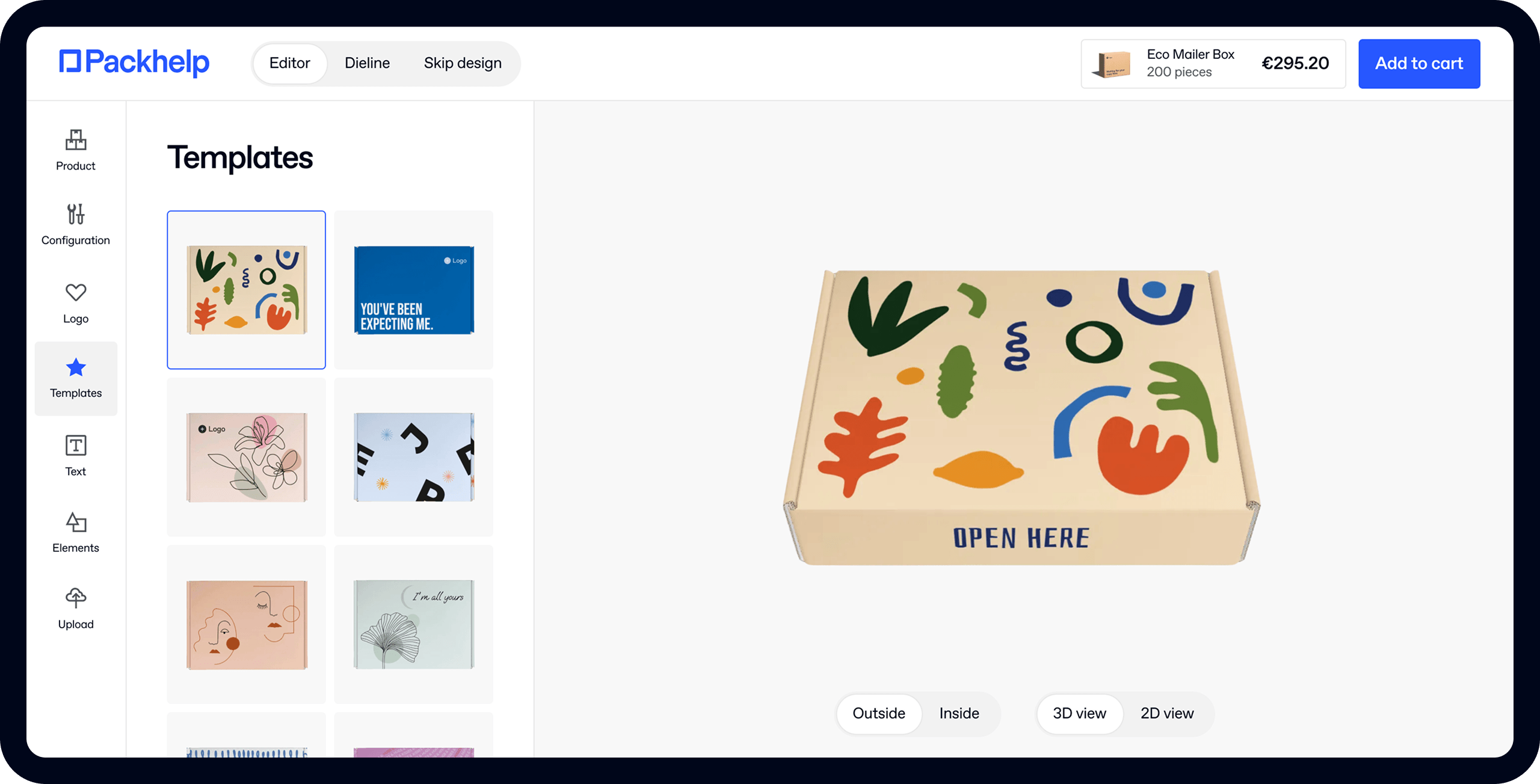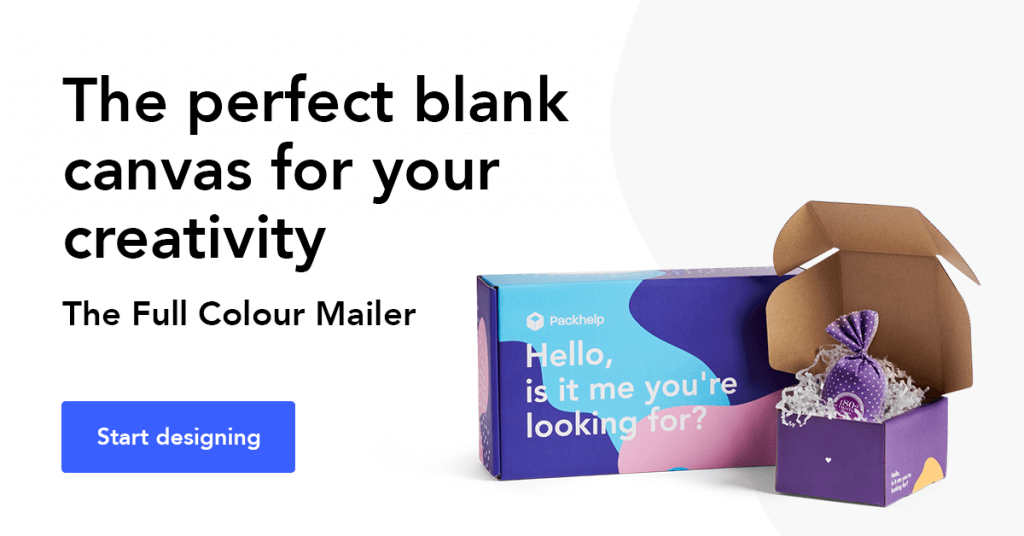Packhelp’s Experts On 2024 Packaging Trends
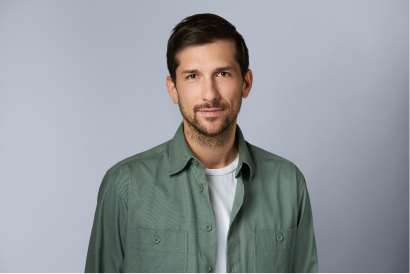
- 200+ templates & patterns
- Real time 3D packaging preview
- Upload logo and choose brand colours
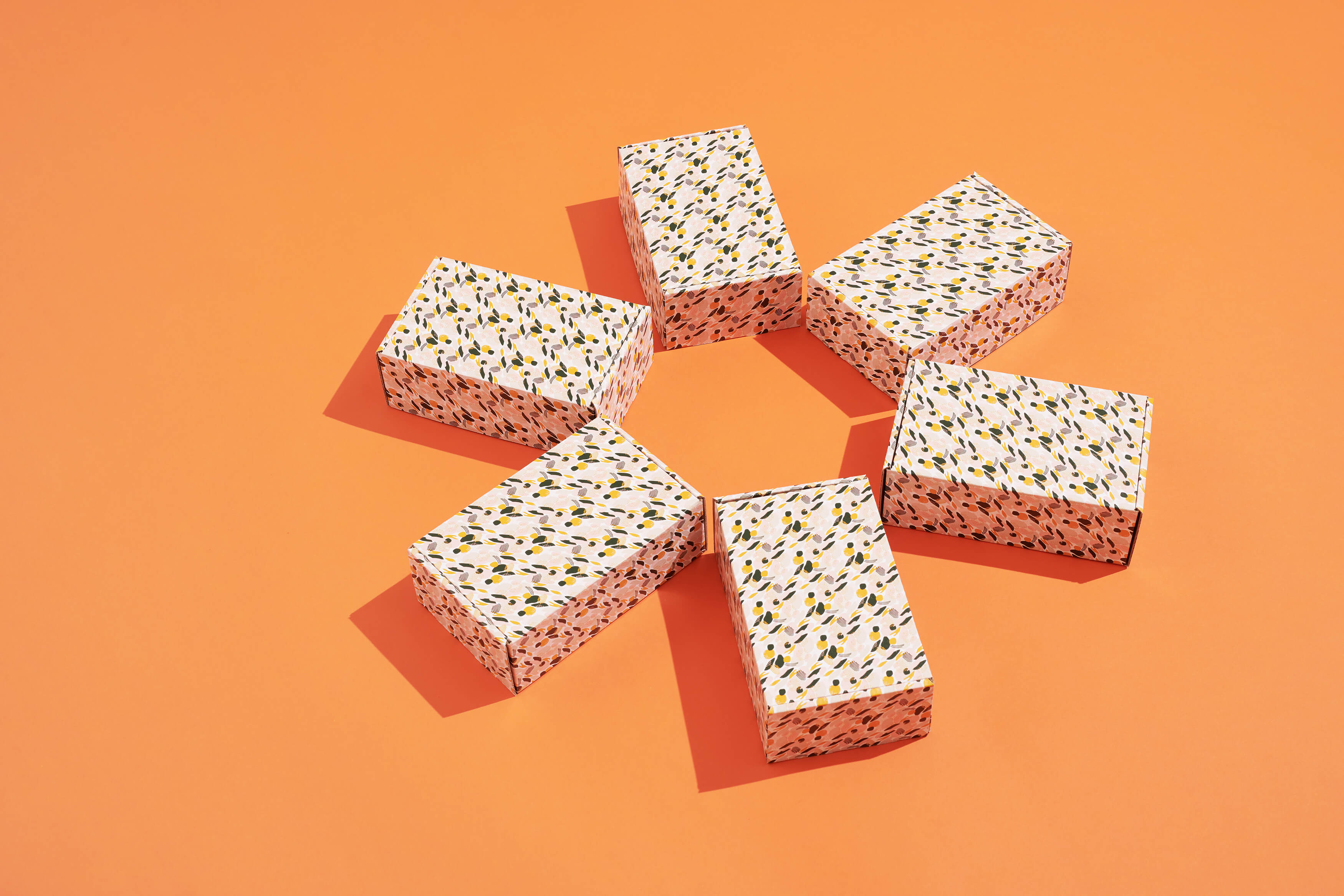
Subscribe now! Receive 15% discount.
Don’t miss out – get 15% off your first order when you join the newsletter. It’s fast, free, and kinda smart.
You're now subscribed!
In this article:
Packaging, like a form of fashion, has trends that come and go annually, if not quarterly.
But these trends aren't just about the visual design of packaging; the same way fashion trends aren't always about the visual appearance of the garment.
The shape, material and that design's place in the bigger scheme of the business and society play a massive role.
And, despite the quandaries that the last year or so has thrown at everyone, packaging design grew and evolved in its way.
Whether it was in the world of ecommerce, the up-and-coming q-commerce industry, or traditional retail, packaging grew and evolve in many forms.
As a company that sold custom packaging to over 53,000 customers in 2023, we've seen quite a few trends that will set the scene for 2024.
In this article, Packhelp's team of experts share their observations in packaging design from 2023, and we predict what we'll see more of in 2024.
Data-backed packaging trends
Everyone loves a bit of data to support a statement.
At Packhelp, our intuitive online designer gives us access to a load of information to help us predict and assess packaging trends that are coming, and those that are going.
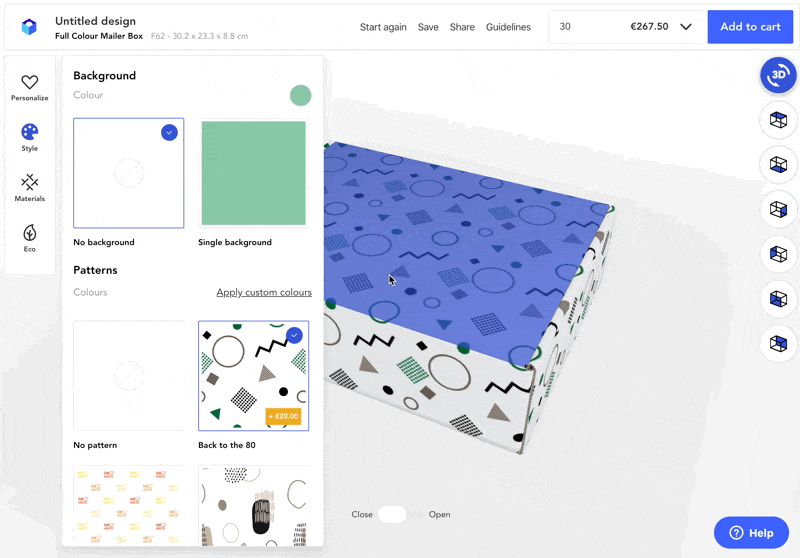
Over the calendar year of 2023, here are some data-backed packaging trends that we discovered:
Fonts
Fonts are important - they say a lot about your branding.
In our editor last year, the 3 most popular font families were:
- Times New Roman (27% of designs)
- Montserrat (7.8%)
- Lato (5.8%)
Of the 22 font families available in the Packhelp editor, IBMPlexSerif was the least popular, being used in only 0.58% of designs.
Text
The most common text placed on the packaging design of our users last year were:
- The company website
- ‘Follow us on...’
- Brand slogan
- Some form of gratitude or thank you
Users generally added 2.6 text boxes to their packaging design.
Shapes
The Packhelp editor also allows you to easily add common shapes and elements to your packaging design, such as social media icons:
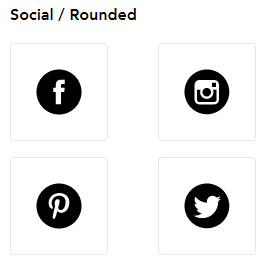
Nearly 25% of all orders made in the Packhelp designer last year had some form of social media logo on them.
Sustainability logos
Common disposal and recycling logos were also popular, too.

One packaging design trend we saw was the increased use of logos to show off the environmental properties of the packaging being used:
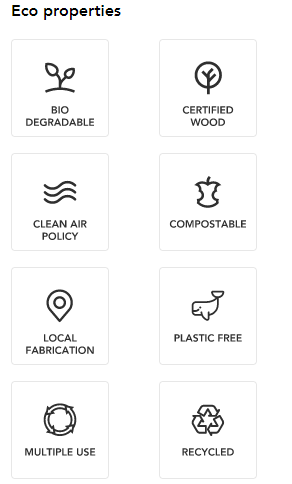
Overall, the most commonly used shapes in the Packhelp designer were:
- Recycled
- Biodegradable
- Eco-friendly
Staying with the eco-friendly trend, many brands added Packhelp's 'eco badge' to their packaging to show their commitment to reforestation around the world.
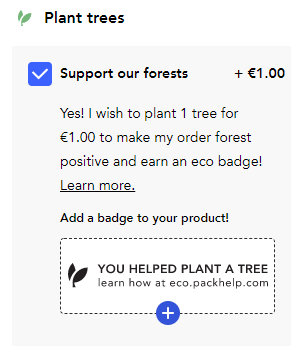
With a €1 donation per order, our customers have helped replant over 3000 trees globally and are using their design to empower their own customers to do the same.
Now let's take a look at the most common packaging trends of 2023 as seen by the Packhelp team!
The ongoing supply chain crisis.
Let's get the bad news out of the way first - supply chain shortages.
A trend that we'll, unfortunately, see more of in 2024 is the ongoing effects of a disrupted supply chain.
In simple terms, shipping raw materials to manufacturers, and getting products to retailers and distributors is going to take more time.
Expect packaging lead times to get longer, not shorter in the immediate future.
But why?
A global labour shortage combined with ever-increasing prices of raw materials is leading to shortages and delivery disruptions.
The UK now imposing customs duties and import fees on goods from the EU are only exacerbating the problem for British consumers.
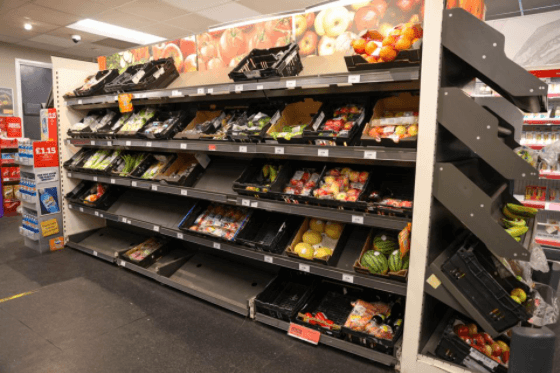
A shortage of dockworkers on the US West Coast means that shipping vessels from Asia now have to wait offshore for up to 13 days to unload their goods.

Once the goods are offloaded, there's a lack of truck drivers to take the shipping containers to local distribution hubs, slowing down delivery times even more.
"Border controls and mobility restrictions, the unavailability of a global vaccine permit and declining demand due to blockages have combined for a perfect storm in which global production will be hampered," explains Tim Uy of Moody’s Analytics.
Because these deliveries are not made on time, costs and prices grow. Therefore, companies that can afford it place high-volume orders to avoid running out of goods.
Such orders not only compound the pressure for manufacturers but make it harder for smaller businesses to get what they need.
The blockages in the supply chain won't clear up in Q1 of 2024, with the holiday shopping of Q4 2023 expected to add even more pressure.
Learn more about how Packhelp is helping you get your packaging during this crisis
Design and sustainability go hand in hand.
When you think about sustainable packaging, there's every chance that your mind immediately goes to cutting edge materials technology, like Ikea's use of mushroom-based packaging.

While 2023 saw a massive uptake in the use of sustainable packaging, it wasn't the material that led the initiative, but rather packaging's product lifecycle in the design process.
Artur Oboleński, head of Packhelp's R&D facility says that many brands took steps to reduce emissions and protect the environment simply through effective packaging design.

Packhelp assisted many brands in increasing the sustainability of their packaging by letting the packaging's EOL (end of life cycle) stage affect its initial design.
Find out why conducting life cycle assessments is so important
This was achieved in a variety of ways, namely using as little packaging material as possible, and using certified recyclable packaging, including packaging for the food industry.
Packhelp also helped brands leverage reusability, launching custom tote bags made from organic cotton or recycled materials, as well as muslin bags.

Consumer belief has shifted in the last 12 months.
We're more conscious of where our products come from, But we're also more aware that the situation isn't as black and white as initially anticipated.
Such initiatives like the EU's Ecodesign Directive, aimed at improving the energy efficiency and sustainability of products reflect this change.

Brands are already starting to follow this shift.
Rather than implementing cutting edge materials, the simple concept of using less is being explored.
A fine example of this can be seen in British telco, Raylo.
The brand found a 20% decrease in weight and an 11% decrease in cost by merely using packaging that was tailor-made from the ground up, specific for their application and business goals.
Click here to see more about Raylo's savings from optimised packaging design
Patterns and continuity
Many brands that relied on Packhelp this year used a pattern as the core of their packaging design.
After launching our range of customisable patterns, we noticed many brands changing their existing packaging designs for a pattern-based design.

Learn more about Stripe and Stare's packaging design here
Using the online designer, you can pick from dozens of existing patterns and customise them in an almost endless amount of ways.
And the creativity that we saw from our users was indescribable!
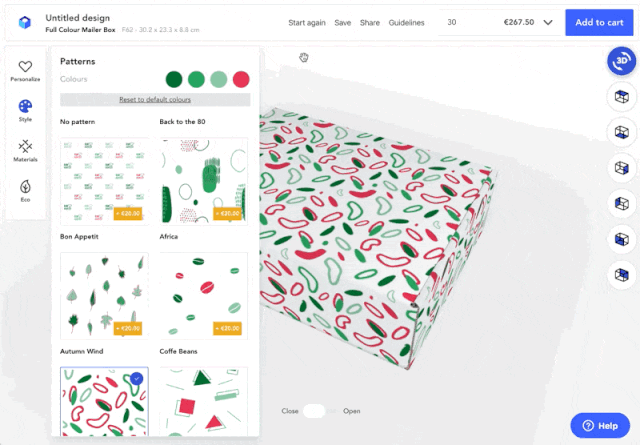
Explore Packhelp's range of customisable packaging patterns here
Patterns are a fantastic design element because if done right, they can give the feeling of a completely different texture than cardboard.

Print certain patterns in the colours and add a matte finish and you can create a fantastic feeling of depth, too.

Imperfectly perfect
There's a certain beauty in imperfection, and perfection isn't perfect for many demographics.
Counter-culture has created a large market for brands to thrive on rough, raw, rugged design, as well as branding of the same calibre.
But imperfection can also invoke feelings of purity, simplicity and emotion, as you can see below from Halbuki and their use of paper cans:

Learn more about Halbuki and the role their branding plays in business
Whether it's the personal touch of barely readable handwriting that says thanks or the wear and tear of a shape that's been beaten up, imperfection can build trust and even add a sense of exclusiveness and luxury to a brand.

Get a quote on your own drawer box like the one above
In 2023, we saw many brands take their rough, asymmetric and imperfect branding and put it front and centre on their packaging.

The creative use of doypacks
Also called standup pouches, this form of packaging is more commonly seen as the default form of packaging for coffee, packaging for tea, nuts, and other edible drygoods.

In 2023, we saw many brands from many different industries decide that a standup pouch was an innovative form of custom packaging for their brand.
The Packhelp team noticed that food brands loved their doypacks, but they were also used as packaging for clothes, most commonly, socks.

The team also saw that it was a common form of CBD oil packaging.

As the hemp, cannabis and CBD industry continues to grow thanks to governments changing their stance on this material, look for doypacks to only increase in versatility in 2024.
Find the ideal packaging solution for cupcakes and muffins here.
Immersive and branded unboxing experiences.
We all know what branding is - it's the way that your brand visually labels and presents itself to the world.
And we all know that branding belongs on your website, product, social channels, and, of course, all forms of your packaging.

But there's more to an unboxing experience than a branded box.
It's about creating a branded experience around your product.
And the best way to do that is to ensure that everything in your packaging has been customised.
Of course, there's the packaging itself, which should no doubt have your branding both inside and out.

Click here to learn more about Concrete Jungle and their unique packaging design
Tissue paper to wrap up delicate products and other void fillers are also another branded opportunity - but it doesn't just have to be your logo that's repeated over and over.
Take the geometry of your logo and expand it into a pattern.

Branded tape to seal closed your box is a tiny little addition, but it shows that you pay close attention to the finest branding details.

Any thank you cards, warranty forms and instruction manuals should also have your branding on it.
Even freebies such as stickers should have your logo to help level-up your unboxing experience.
Custom labels and counter display boxes can help level up the unboxing experience of a retail store, too.
As more of us will default to online shopping in 2024, expect the importance of a quality unboxing experience to become essential, rather than 'nice to have'.
Switching to sustainable materials
Materials technology was something that the Packhelp team saw taken up by brands of all shapes and sizes.
More companies are stepping away from their dependence on plastic packaging, as well as multi-material packaging solutions.
The uptake of easy to recycle mono-material packaging and improving an existing circular economy is a trend that the Packhelp team believes will set a precedent in 2024.

Biopolymers were also a common request, as brands that sell biodegradable and compostable materials require packaging of a similar property.
Fibre-based materials and non-wood fibre also grew in popularity, with the most sought after alternative materials being leaves, bamboo and sugarcane.
These packaging solutions were taken up by many clothing brands, but also food brands, like bakeries, chocolatiers and cake makers operating out of their homes and thus influenced a lot of food packaging design.
It's worth noting that these materials are byproducts of other processes, thus removing the overall waste of the initial product.

The most common theme amongst many brands implementing sustainable materials was the fact that they were replacing the materials of an existing design, rather than redesigning from the ground up.
This goes to show that merely changing packaging materials is arguably the best thing a brand's packaging can do for the environment.

Many returning Packhelp customers have also become a part of Packhelp's collaboration with One Tree Planted; a free service that replants trees in deforested areas based on the quantity of packaging you buy.

Almost 97% of these brands place a 'tree' badge on both their packaging and website to tell their customers more about their sustainable packaging decisions.
See how One Tree Planted is helping restore forests in Romania
A second chance at life
In a move that was not predicted at the beginning of 2023, more brands have started to work reusability into their packaging design.
We've seen several brands design their packaging to solve the problem of something other than packaging.
Some examples include:
- Packaging that doubles as a dollhouse
- The blank-canvas for a colouring-in competition
- Packaging to sprout seeds in

All these ideas have come from forward-thinking brands who assess how relatively custom mailer boxes can be part of an experience that involves their product.
The British Plastic Tax sped up this idea, even more, forcing brands to lower their dependence on single-use packaging of any kind.

Cardboard boxes like this not only add value to your product but also carry the environmental benefit of staying out of recycling plants until necessary.
Parting thoughts
Sustainability has been the overwhelming theme that the Packhelp team has seen throughout 2023.
A notable mention goes to the increased need for security and hygiene, thanks to the coronavirus pandemic.
It's safe to say that, thanks to both local legislation and buyer preference, sustainability in packaging design will only grow to be more important throughout 2024.
With the 'new normal' being unclear at best, consumers are also going to want packaging that meets their hygienic needs.
Whether you'd like to make your packaging more sustainable in the New Years or explore hygienic packaging options, Packhelp's design experts can help you create the ideal packaging solution for your business's needs.



